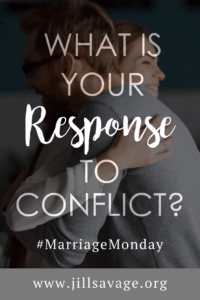 Mark: Conflict handled without care can bring out the worst in us. Unless we’re intentional about responding rather than reacting, we can end up with a mess to clean up.
Mark: Conflict handled without care can bring out the worst in us. Unless we’re intentional about responding rather than reacting, we can end up with a mess to clean up.
Jill: It’s rare that we both haven’t contributed to the mess in some way. So we both usually have something to clean up.
Mark: We were recently in a coaching session with a couple working through a conflict that had happened several days earlier. One of the questions Jill asked the couple really stuck with us.
She asked them each, “As it relates to this conflict what’s going on inside your head and your heart? Justification, condemnation, or conviction?”
Jill: When we’ve had a “falling out” with each other, we usually end up in one of these three places. Let’s look at them:
Justification
When we defend ourselves, justify our reactions, and even blame our spouse for the way we reacted, pride is what reigns in our hearts. This keeps us from owning what’s ours, apologizing, and asking for forgiveness for what we contributed to the mess. Pride causes a disconnect in the relationship and causes distance between our hearts.
We untangle pride with our God-Tool of humility. Proverbs 11:2 tells us, “When pride comes, then comes disgrace, but with humility comes wisdom.”
Condemnation
When we criticize ourselves, feel hopeless to change, and blame ourselves for everything wrong in our relationship, shame is what reigns in our hearts. We tell ourselves, “I’m a screw-up. I never get it right. I’m not good-enough.” We let our circumstances define us. Shame fuels passivity and hopelessness. It shuts down our ability to both give and receive love. We have trouble giving love because our identity isn’t in Christ–it’s in our mistakes or the negative messages we were told in childhood. When we can’t fully receive God’s love we’re limited on the love we have within us to give away. Shame also causes a disconnect in the relationship and creates distance between our hearts.
We untangle shame with the God-Tool of wisdom. We learn who God says that we are and we replace the lies we’re believing with His truth.
Conviction
When we own what we brought to the mess, can apologize and ask for forgiveness, repentance is what reigns in our hearts. When we repent we make a U-turn. We realize that we’re headed in a wrong direction and we stop, clean up the mess (with our spouse and with God), and turn around and head in a different direction. Disrespect is replaced with respect. A lack of self-control is replaced with self-control. Harsh words are replaced with kind words. Repentance increases trust, deepens intimacy, and helps us feel connected to each other.
Conviction requires us to use the God-Tools of courage, wisdom, compassion, forgiveness, grace, and humility.
Mark: In review:
- Justification says “I’m not wrong.”
- Condemnation says, “I’m wrong. I’m always wrong. I was created wrong,” or “I did a bad thing, so I’m a bad person.”
- Conviction says, “I was wrong. I have a mess to clean up. I need to apologize and ask for forgiveness.”
Jill: Marriage gives us wonderful opportunities for personal and spiritual growth. The next time you have conflict in your marriage, ask yourself what’s going on in your head and your heart. If it’s anything other than conviction, call it what it is and do what you need to do to untangle the pride or shame that keeps you from bringing your best self to your marriage.











